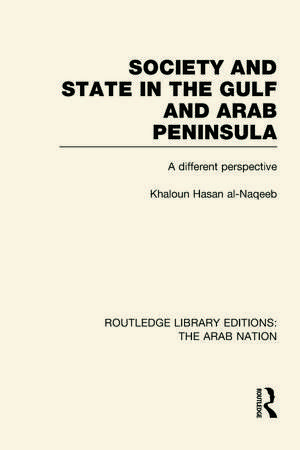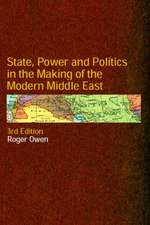Society and State in the Gulf and Arab Peninsula (RLE: The Arab Nation): A Different Perspective: Routledge Library Editions: The Arab Nation
Autor Khaldoun Al-Naqeeb Traducere de L Kennyen Limba Engleză Hardback – 10 mai 2012
Preț: 766.66 lei
Preț vechi: 1156.02 lei
-34% Nou
Puncte Express: 1150
Preț estimativ în valută:
146.70€ • 153.55$ • 122.10£
146.70€ • 153.55$ • 122.10£
Carte tipărită la comandă
Livrare economică 31 martie-14 aprilie
Preluare comenzi: 021 569.72.76
Specificații
ISBN-13: 9780415623964
ISBN-10: 0415623960
Pagini: 230
Dimensiuni: 156 x 234 mm
Greutate: 0.59 kg
Ediția:1
Editura: Taylor & Francis
Colecția Routledge
Seria Routledge Library Editions: The Arab Nation
Locul publicării:Oxford, United Kingdom
ISBN-10: 0415623960
Pagini: 230
Dimensiuni: 156 x 234 mm
Greutate: 0.59 kg
Ediția:1
Editura: Taylor & Francis
Colecția Routledge
Seria Routledge Library Editions: The Arab Nation
Locul publicării:Oxford, United Kingdom
Public țintă
General, Postgraduate, Professional, and UndergraduateCuprins
Foreword. Preface. 1. Introduction: Current Writings About the Region. 2. The ‘Natural State’ Thesis of Society in the Gulf and Arab Peninsula. 3. Gulf and Arab Peninsula Society in ‘the grand imperial design’. 4. The ‘Pax Britannica’ era and the Decline of the ‘natural state’ economy. 5. From rentier to authoritarian state. 6. The authoritarian state in the Gulf and Arab Peninsula. 7. Conclusion: The Looming Crisis in Gulf and Arab Peninsula Society. Statistical Appendix. Notes. Bibliography. Index.
Descriere
This book is both a history and contemporary analysis. Charting the main turnpoints as the growth of cities, trade routes, the petroleum industry and growth of the authoritarian state the author argues that central bureaucratic control is limiting growth. He describes the state as governed by the interests of the ruling family who continue to block opportunities for social mobility. He is also critical of the lack of a broad, productive base in the economy, the export of capital and its effect on investment in local resources, as well as the technological dependence on the West.

















